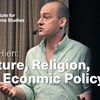winners

Northern Saints and Southern Sinners? Culture, Religion and Economic Policy
Research seminar with Josef Hien, political scientist and researcher at the Institute for Futures Studies. This presentation promotes a novel explanation of the rift between Northern and Southern memb
Interview with Nobel prize winner Thomas Schelling
In 2013 the Institute for Futures Studies arranged the 6th annual INAS-Conference in Stockholm. The conference was opened by Thomas Schelling, being interviewed by Richard Swedberg.
Nobel Prize winner Thomas Schelling keynote speaker at the INAS conference
On the 7th and 8th of June, the International Network for Analytical Sociologists, INAS, will meet for its sixth conference, this time in Stockholm hosted by the Institute for Futures Studies. Thomas
Learning to play
In 2007, the Swedish gambling agency ran a simple gambling game called LIMBO. Gamblers were invited to stake 10 kronor on a number of their choice between 1 and 99,999. The person choosing the smalles
Jason Beckfield: Unequal Europe: Regional Integration and the Rise of European Inequality
Jason Beckfield, Professor of Sociology at Harvard University. Abstract The Euro-crisis of 2009–2012 and the UK’s 2016 vote to leave the EU vividly demonstrated that EU policies matter for the distribut

Interview with Thomas Schelling
On the 7th of June, 2013 professor and Nobel Prize Winner Thomas Schelling came to visit Stockholm, Sweden and the Institute for Futures Studies in order inaugurate an international research conferenc
Documentation
Here you will find documentation from some of our previous research seminars. November 29th 2013: Contexts and conditions of ethnic discrimination. Evidence from field-experiments in German housing mark by Katrin AusprungRead the blog post
The Origin of Status Inequality: A Simulation-Based Study
Gianluca Manzo, Sociology Sorbonne Status hierarchies have the characteristic of being increasingly asymmetric distributions that, however, never turn into winner-take-all structures. In this paper we

Bortom IT. Om hälsa i en digital tid
Lansering av rapporten med samma namn där flera av rapportförfattarna berättar om förutsättningarna för att omvandla vård och omsorg med digitaliseringens hjälp, och om vad som står i vägen. Medver
Individual and Collective Duties to Rescue
The ongoing refugee crisis in Europe, along with calls for intervention in conflicts in Syria and elsewhere, has pushed discussion of duties to rescue into the political spotlight. At the same time, t








